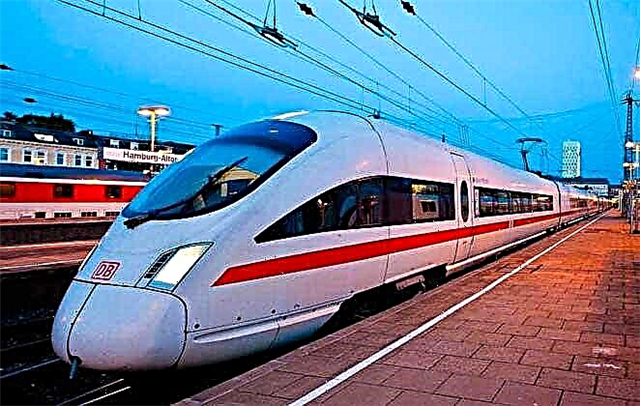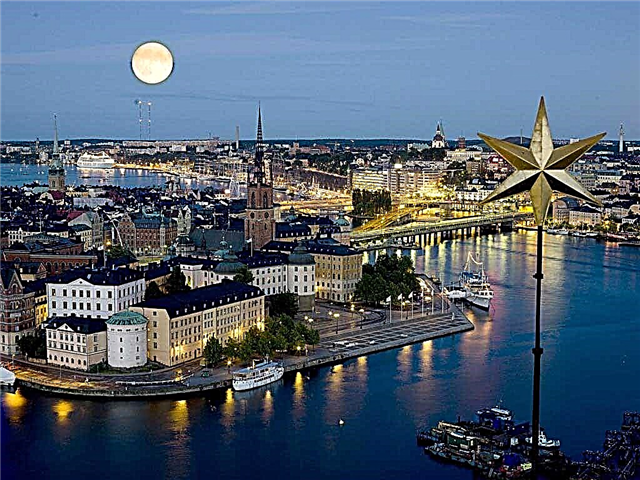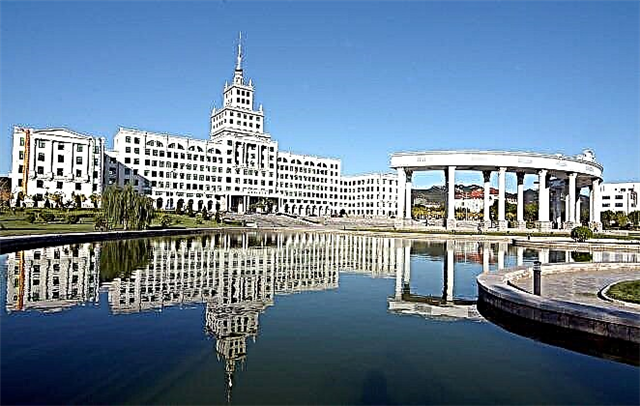More and more applicants from Russia and other CIS countries choose to study in China, which allows them to get a high level of education at significantly lower prices than in universities in the USA and Europe. But in order to take advantage of all the advantages of studying in the Middle Kingdom, it is important to choose the right university. Therefore, potential students of Chinese universities should familiarize themselves with the basic information about the Harbin Polytechnic University (HPU): find out how the admission procedure goes and how much it will cost to study.

General information
The university was founded in Harbin in 1920, during the time of the joint Sino-Russian administration, therefore it was originally called the "Sino-Russian Industrial School". It was trained mainly by the personnel of the Sino-Eastern Railway.
In 1922 the school was transformed into the "Sino-Russian Industrial University". In 1928, the name of the university changed again - it became the "Industrial University of the North-Eastern Province", and it was managed by the Chinese authorities together with the USSR.
In the same year, the university was renamed for the last time and received its current name - Harbin Institute of Technology.
Since 1945, the management of the KhPU was completely transferred to the PRC. In 2009, the university entered the prestigious "League C9", which united the best universities in the Middle Kingdom.
At one time, the university graduated from such famous people as:
- Sun Yunxuan, Prime Minister of Taiwan;
- Chen Guangxi, one of the fathers of Chinese cybernetics;
- Ma Xingzhui, engineer and politician;
- Ma Zuguan, physicist.
HIT is ranked 10th in the ranking of PRC universities according to Shanghai Ruanke and 280th in the world according to US News. However, the Times Higher Education rating for the university is not so high: it ranks only 401st in the world, 53rd in Asia and 13th in China.
Infrastructure
HPU consists of three campuses, which are located:
- in Harbin, Heilongjiang Province (northeastern China) - this is the first campus of the university;
- in Weihai, Shandong province (center of the country) - established in 1985 on the basis of the national technology park;
- in Shenzhen, Guangdong Province (southern China) - opened in 2002 in collaboration with Peking University, Tsinghua University and the University of Hong Kong.
The main campus area is 3.4 km2, which has made it possible to accommodate educational buildings, dormitories, libraries, gyms, laboratories, experimental plants and canteens. This campus was built mainly during the times of close Soviet-Chinese partnership (from 1949 to 1959), so its architecture is familiar to the residents of the Russian Federation. Even the main building of the KhPU is a mini-copy of the main building of the Moscow State University.
The campus in Weihai is more modest - only 1.3 km2. It houses mainly the faculties of transport, industry and computer science.
Shenzhen campus is the smallest (0.14 km2), but the most modern.
In 2021, the university has 3,045 teachers and 16,200 bachelors, 8,000 masters and 5,200 postgraduates. The number of foreign students is 1,100.
Popular specialties
 In 2021, the following faculties of Harbin Polytechnic University were opened:
In 2021, the following faculties of Harbin Polytechnic University were opened:
- architectural;
- aerospace;
- biology and biotechnology;
- civil engineering;
- humanities and law;
- natural sciences;
- foreign languages;
- computer science and technology;
- Marxism;
- materials science;
- mechatronics;
- transport;
- chemical;
- ecology;
- Economics and management;
- electricity and automation;
- electronics and information technology;
- energy science and industry.
Nine of the specialties taught here have received priority status in the PRC, which means increased funding:
- civil Engineering;
- mechanical engineer;
- computer science and technology;
- Materials Science;
- Mechanics;
- scientific foundations and technologies for the production of instruments;
- scientific foundations and technologies of management;
- control systems;
- energy and engineering thermal physics.
It is not surprising that these are the specialties that are most popular with both Chinese and foreign students. In addition, the Harbin Polytechnic University is traditionally famous for the specialties not included in this list:
- aviation;
- automation;
- architecture;
- business (including MBA);
- natural Sciences;
- engineering (various directions);
- robotics;
- ecology.
Of particular interest for applicants from the Russian Federation may be admission to the Harbin Joint Chinese-Russian University. N.E. Bauman, which was opened on the basis of the KhPU in cooperation with the Moscow State Technical University. In 2021, only 2 specialties are available in it: materials science and ecology.
Also, Russians may be interested in entering the faculties of the Chinese language, history, literature or culture - obtaining such an education will allow them to find prestigious work in universities and language centers of the Russian Federation upon returning home.
If you plan to stay in China after receiving your diploma, you should pay attention to such specialties as:
- foreign languages;
- right;
- economy (preferably international trade).
If you are not proficient in Chinese and are not sure that you will have time to master it in language courses, it is worth considering enrolling in specialties taught in English. These include:
- geotechnics and underground construction;
- market research and forecasting;
- marketing;
- materials for civil construction;
- fundamentals of management;
- polymer materials and technologies;
- managment structure;
- construction;
- technical economics;
- technique and technology of chemistry.
A complete list of specialties will help clarify the official website of the KhPU.
Admission procedure
 To enter the Harbin Polytechnic University for a bachelor's degree, you need to be over 17 years old, have completed secondary education and prepare the following documents in advance:
To enter the Harbin Polytechnic University for a bachelor's degree, you need to be over 17 years old, have completed secondary education and prepare the following documents in advance:
- international passport;
- school certificate with an insert;
- university or college diploma (if available, with an insert);
- payment guarantees (sponsorship letter, account statement, grant receipt documents);
- health certificate (translated and certified form 0-86y);
- language certificate HSK at a level not lower than 4 (in the Russian Federation it can be obtained from the Russian branches of the Confucius Institute, which are usually created at large universities).
The certificate, diploma and other documents on education must be necessarily translated into Chinese or English and certified by a notary. Moreover, they will have to be nostrified.
For admission to the magistracy, you will additionally need:
- bachelor's degree with an insert;
- recommendations from two teachers (in English or Chinese).
To start admission, you must send a motivation letter to the university with the justification for the choice of the university and specialty and brief information about yourself. Acceptance of documents begins in January and closes at the end of June.
How are the exams
In case of successful collection of the package of documents, the university will send you an official invitation and visa form JW202, the completion of which will allow you to come to China and pass the entrance exams.
The set of exams will depend on the chosen specialty and the academic difference between the training courses you have taken and the minimum amount of knowledge accepted in the PRC.
All exams are taken in Chinese, in person and on campus, and the examination groups are formed from both foreign and Chinese applicants.
Take a sociological survey!
[yop_poll id = ”7 ″]
Organization and cost of training
For most specialties, teaching is conducted in Chinese in groups of both international and local students. In some cases, separate groups of foreign students are formed, which are differentiated by the level of proficiency in the Chinese language.
Additional language courses are available for students with insufficient knowledge of Chinese.
The academic year is divided into two semesters: the autumn one usually lasts from September 1 to December 20, and the spring one begins on March 1 and usually lasts until June 20.
Classes are held on weekdays (Monday to Friday) in the morning. The term of study for the bachelor's degree is 4 years, and the study for the master's degree lasts for 2 years.
The cost of training depends on the chosen specialty and training program:
| Program | Cost, RMB | Cost, $ |
|---|---|---|
| Chinese language, 1 semester | 7300 | 1070 |
| Chinese language, 1 year | 14600 | 2130 |
| Chinese Bachelor's Degree | 20,000 / year | 2 910 / year |
| Bachelor in English | 26,000 / year | 3 780 / year |
| Master's in Chinese | 28,000 / year | 4 070 / year |
| Master in English | 34,000 / year | 4 950 / year |
Upon admission, you must pay at least a year of study, as well as pay a one-time registration fee of 400 yuan (~ $ 59). Upon arrival in Harbin, in order to obtain a residence permit, you will need to undergo a medical examination, the cost of which is about 420 yuan ($ 62).
Be prepared for other study-related expenses as well, such as:
- health insurance policy, 800 yuan ($ 118) per year;
- study visa extension, 800 yuan ($ 118) per year;
- study materials fee, up to 250 yuan ($ 37) per semester;
- registration of a Chinese bank card, 30 yuan ($ 5) one-time.
Is it possible to get a grant or scholarship
 In 2021, the university has the following scholarship and grant programs:
In 2021, the university has the following scholarship and grant programs:
- State scholarships are provided to foreign undergraduates and postgraduates. Its receipt allows not to pay for tuition and living, as well as receive a scholarship in the amount of 3,000 (undergraduates) and 3,500 (graduate students) yuan per month.
- The Qingrui Scholarship is available to international students under the age of 30 for English-language undergraduate programs. Depending on the academic success of the recipient, it is divided into 4 levels - free tuition and accommodation, free tuition, a 50 or 30% discount on tuition. The duration of the grant is 4 years.
- The grant for talented international students is provided to international students under the age of 30 with good academic performance, conditions are similar to Qingrui Scholarship, but the grant period is 1 year.
To receive grants and scholarships, you must study at the university for at least 1 semester on a paid basis.
HIT is also a participant in such international grant programs as:
- Chinese Government Scholarship Scheme;
- China Shanghai Cooperation Organization Scholarship Scheme;
- Erasmus +.
Internship and employment prospects
KhPU has cooperation agreements with many Chinese manufacturing enterprises, so the university has internship programs. Taking into account the fact that, according to Chinese law, after graduation, all foreign students can extend their visa for another year and use this time to look for work, studying in Harbin opens up good prospects for employment in the PRC.
The easiest way to find an employer will be holders of a foreign language teacher diploma (monthly salary is $ 900), an IT specialist (from salary up to $ 4500 / month) or a foreign trade specialist (knowledge of Russian and / or English will allow you to get a place in a Chinese corporation with a salary of several thousand dollars).
Cost of accommodation and meals
 In all universities of the PRC, including the Harbin Polytechnic, student accommodation is organized on the basis of hostels on campuses. Students are accommodated in double rooms, which are equipped with tables, chairs, beds (with a set of linen) and a wardrobe.
In all universities of the PRC, including the Harbin Polytechnic, student accommodation is organized on the basis of hostels on campuses. Students are accommodated in double rooms, which are equipped with tables, chairs, beds (with a set of linen) and a wardrobe.
Two double rooms form a block, each of which has a toilet and a bathtub with round the clock hot water. There is Wi-Fi in the hostels, the cost of an unlimited connection to which is 30 yuan ($ 5) per month. The hostel costs 600 RMB ($ 90) per month.
Meals in the university cafeteria will cost another 1,200 yuan ($ 180) per month. Payment is made each time separately, depending on the order made.
Dormitories and canteens remain open during the holidays, which greatly facilitates the living conditions of foreign students.
The reviews of the majority of Russian students who graduated from KhPU about the comfort of the hostels are quite positive: many praise the accommodation in double rooms, the availability of all the necessary furniture and amenities, good repair, proximity to educational buildings, ease of registration and check-in.
So if you have not found a very profitable rental offer, you can safely move into a hostel on campus - it will be profitable and convenient. Moreover, to live outside the campus, you need to obtain special permission from the university administration.
Conclusion
Harbin Polytechnic University is rightfully included in the top ten higher educational institutions of the Celestial Empire. It has a high rating, government support and a bias towards engineering and technical specialties.
Studying at KhPU allows you to get high-quality and inexpensive (from 3 to 5 thousand dollars per year) education and opens up the prospects for employment in the PRC.
Grant and scholarship programs will also help save money.











